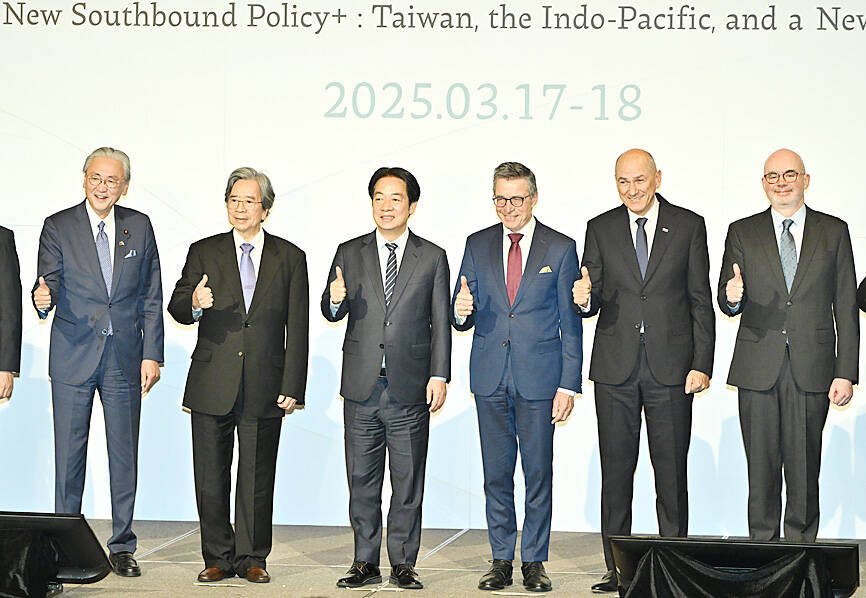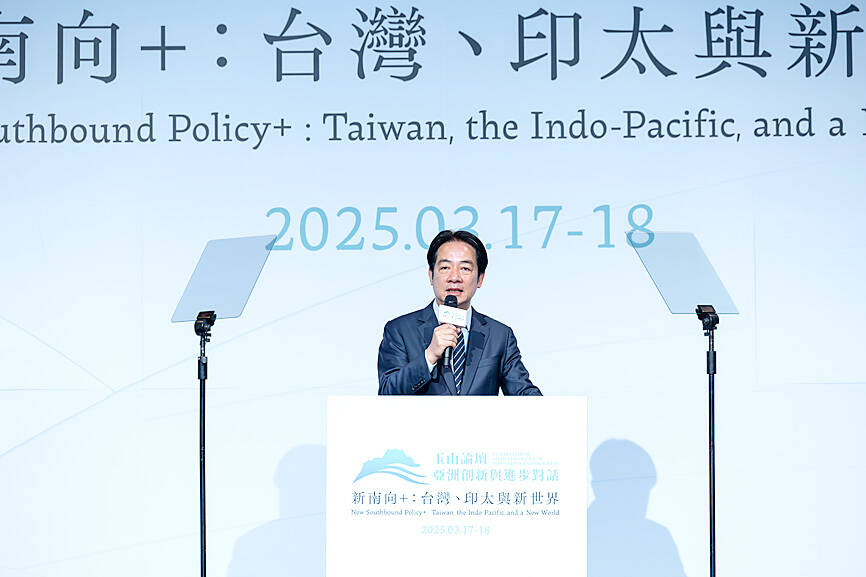Taiwan will work with democratic partners to boost “non-red” supply chains and digital solidarity, as well as respond to threats and challenges posed by expanding authoritarianism, President William Lai (賴清德) said at the opening of the Yushan Forum in Taipei yesterday.
The theme of this year’s two-day annual forum, cohosted by the Taiwan-Asia Exchange Foundation and the Ministry of Foreign Affairs, is “New Southbound Policy+: Taiwan, the Indo-Pacific, and a New World.”
The Yushan Forum has become more than a platform for the New Southbound Policy, with more than 3,600 international participants in the past eight years, deepening Taiwan’s connections with the world, Lai said.

Photo: Tien Yu-hua, Taipei Times
“Today’s Taiwan celebrates not only the democratic achievements that are recognized by the international community, but also our strengths in the semiconductor and other tech industries, which enable us to play a key role in restructuring global democratic supply chains and the economic order,” the president said.
Building on its foundation as a “silicon island,” Taiwan is accelerating its innovation and artificial intelligence applications, as well as developing other promising fields, including quantum technology and precision medicine, he said.
“In the past, Taiwanese industries went from moving ‘westward’ across the Taiwan Strait, to shifting ‘southbound,’ to working closer with the ‘north,’ but now we are confidently stepping across the Pacific, reaching ‘eastward’ to the Americas and other regions,” he said.

Photo: screen grab from the Presidential Office’s Flickr page
“While staying firmly rooted in Taiwan, our enterprises are expanding their global presence and marketing worldwide,” he said.
“Taiwan will continue to engage with the world, and we welcome the world to come closer to Taiwan,” he said. “Through international cooperation, we hope to build an even more inclusive, resilient, prosperous Indo-Pacific, while jointly defending the democracy, freedom and peace we so firmly believe in.”
Lai thanked all the participants for supporting Taiwan, and pledged that Taiwan would “strive alongside its democratic partners to boost ‘non-red’ supply chains and digital solidarity, and together respond to the threats and challenges posed by expanding authoritarianism.”
Japan-Taiwan Parliamentary Friendship Association chairman Keiji Furuya said it was his fifth straight year to attend the forum.
Over the past few years, Taiwan’s GDP has surged to more than NT$32 trillion (US$907 billion), investment in China has dropped from 44 percent to 11 percent of the total, and global trust and recognition of Taiwanese have grown, he said.
Despite the lack of official diplomatic ties, the association has played an important role in connecting Taiwan and Japan in the past 50 years, including allowing Taiwanese to be listed on Japanese family registrations from this year to protect their rights and dignity, he said.
Japan has continued to expand its cooperation with Taiwan in different areas, people-to-people exchanges reached an all-time high last year and the association is working on policies to strengthen bilateral ties for future generations, he said.
Citing former Japanese prime minister Shinzo Abe’s remarks that “a Taiwan contingency is Japan’s contingency as well,” Furuya said peace and stability in the Taiwan Strait has a major impact on global security and supply chains.
China increased its defense spending by 7.2 percent last year, demonstrating its determination to further expand its military power, Furuya said.
“When you look at the actions of Chinese President Xi Jinping’s [習近平] dictatorship, attempting to unilaterally change the ‘status quo,’ we can imagine the risks that lie ahead,” Furuya said. “China’s approach has been consistent; under the guise of international contribution, it concerns only its own benefits.”
As the situation around Taiwan gets more serious each year, it is extremely important for countries with shared common values — democracy, freedom, rule of law and fundamental human rights — to steadily strengthen cooperation, he added.
Meanwhile, reiterating the US’ commitment to stand strong with its allies in the Indo-Pacific region, American Institute in Taiwan Director Raymond Greene told the forum that US President Donald Trump has made clear his deep commitment to securing global peace, and in the Indo-Pacific, it means strengthening deterrence to prevent a war from breaking out.
Peace and stability across the Taiwan Strait are “an indispensable element of security and prosperity for the international community,” he said.
“Every country in the world has stakes in preserving peace in the Taiwan Strait,” Greene said, adding that a conservative estimate is that a Taiwan conflict would cost 10 percent of global GDP, higher than World War II.
The US will continue to assist Taiwan to expand its self-defense capabilities and societal resilience in the face of China’s destabilizing military, economic and diplomatic pressure campaign, he said.
It is crucial that Taiwan rapidly acquire the asymmetric capabilities most needed to deter aggression, he said.
Lai’s initiative to crack down on long-standing Chinese espionage and influence operations should further enhance the US’ ability to cooperate with Taiwan, he added.
The economic cooperation between US and Taiwan, two highly complementary economies, will also make the two counties stronger and safer, while providing benefits to the international community, Greene said.

Taiwan is projected to lose a working-age population of about 6.67 million people in two waves of retirement in the coming years, as the nation confronts accelerating demographic decline and a shortage of younger workers to take their place, the Ministry of the Interior said. Taiwan experienced its largest baby boom between 1958 and 1966, when the population grew by 3.78 million, followed by a second surge of 2.89 million between 1976 and 1982, ministry data showed. In 2023, the first of those baby boom generations — those born in the late 1950s and early 1960s — began to enter retirement, triggering

ECONOMIC BOOST: Should the more than 23 million people eligible for the NT$10,000 handouts spend them the same way as in 2023, GDP could rise 0.5 percent, an official said Universal cash handouts of NT$10,000 (US$330) are to be disbursed late next month at the earliest — including to permanent residents and foreign residents married to Taiwanese — pending legislative approval, the Ministry of Finance said yesterday. The Executive Yuan yesterday approved the Special Act for Strengthening Economic, Social and National Security Resilience in Response to International Circumstances (因應國際情勢強化經濟社會及民生國安韌性特別條例). The NT$550 billion special budget includes NT$236 billion for the cash handouts, plus an additional NT$20 billion set aside as reserve funds, expected to be used to support industries. Handouts might begin one month after the bill is promulgated and would be completed within

NO CHANGE: The TRA makes clear that the US does not consider the status of Taiwan to have been determined by WWII-era documents, a former AIT deputy director said The American Institute in Taiwan’s (AIT) comments that World War-II era documents do not determine Taiwan’s political status accurately conveyed the US’ stance, the US Department of State said. An AIT spokesperson on Saturday said that a Chinese official mischaracterized World War II-era documents as stating that Taiwan was ceded to the China. The remarks from the US’ de facto embassy in Taiwan drew criticism from the Ma Ying-jeou Foundation, whose director said the comments put Taiwan in danger. The Chinese-language United Daily News yesterday reported that a US State Department spokesperson confirmed the AIT’s position. They added that the US would continue to

One of two tropical depressions that formed off Taiwan yesterday morning could turn into a moderate typhoon by the weekend, the Central Weather Administration (CWA) said yesterday. Tropical Depression No. 21 formed at 8am about 1,850km off the southeast coast, CWA forecaster Lee Meng-hsuan (李孟軒) said. The weather system is expected to move northwest as it builds momentum, possibly intensifying this weekend into a typhoon, which would be called Mitag, Lee said. The radius of the storm is expected to reach almost 200km, she said. It is forecast to approach the southeast of Taiwan on Monday next week and pass through the Bashi Channel